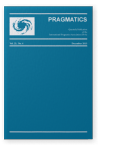Introduction
Language ideologies and writing systems
This special issue of Pragmatics brings together a collection of articles by linguistic anthropologists studying the interplay between the production and interpretation of written language on one hand, and the language ideologies that organize that production and interpretation on the other. This introductory essay offers an overview of the common theoretical foundations upon which the authors in this volume build their analyses of language ideologies and writing systems and underscores the thematic connections across the articles.
References (42)
Androutsopoulos, Jannis
(
2000)
Non-standard spellings in media texts: The case of German fanzines.
Journal of Sociolingistics 4.4: 514-533.
 BoP
BoP
Androutsopoulos, Jannis
(
2009)
‘Greeklish': Transliteration practice and discourse in the context of computer-mediated digraphia. In
A. Georgakopoulou, and
M.S. Silk (eds.),
Standard Languages and Language Standards: Greek, Past and Present. Farnham, England: Ashgate, pp. 221-249.

Androutsopoulos, Jannis
(
2012)
Ethnographic perspectives on multilingual computer-mediated discourse. In
M. Martin-Jones, and
S. Gardner (eds.),
Multilingualism in Discourse and Ethnography. London: Routledge, pp. 179-186.

Angermeyer, Philipp S
(
2005)
Spelling bilingualism: Script choice in Russian American classified ads and signage.
Language in Society 34.4: 493-531.
 BoP
BoP
Barton, David
(
1994)
Literacy: An Introduction to the Ecology of Written Language. Oxford: Blackwell.
BoP
Barton, David, Mary Hamilton, and Roz Ivanic
(eds.) (
2000)
Situated Literacies: Reading and Writing in Context. London: Routledge.

Blommaert, Jan
(
2004)
Writing as a problem: Africa grassroots writing, economies of literacy, and globalization.
Language in Society 33.5: 643-71.


Blommaert, Jan, and Jef Verschueren
Dale, Ian R.H
(
1980)
Digraphia.
International Journal of the Sociology of Language 261: 5-13.

DeFrancis, John
(
1984)
Digraphia.
Word 35.1: 59-66.


Errington, Joseph
(
2001)
Colonial Linguistics.
Annual Review of Anthropology 301: 19-39.


Feng, Zhiwei, Binyong Yin, and Apollo Wu
(
2000)
The Chinese digraphia problem in the information age.
Studies in the Linguistic Sciences 30.1: 229-234.

Gal, Susan, and Kathryn Woolard
Gee, James Paul
(
1992)
The social mind: Language, ideology and social practice. New York: Bergin and Garvey.
BoP
Gee, James Paul
(
2012)[1990] Social Linguistics and Literacies. Fourth Edition. London: Routledge.
BoP
Grivelet, Stephane
(
2001a)
Introduction.
International Journal of the Sociology of Language 1501: 1-10.


Grivelet, Stephane
(
2001b)
Digraphia in Mongolia.
International Journal of the Sociology of Language 1501: 75-93.
BoP
Irvine, Judith, and Susan Gal
(
2000)
Language ideology and linguistic differentiation. In
Paul Kroskrity (ed.),
Regimes of language. Santa Fe, NM: School of American Research Press, pp. 35-83.

Jaffe, Alexandra
(
1999)
Ideologies in Action: Language Politics on Corsica. Berlin: Mouton de Gruyter.
 BoP
BoP
Jaffe, Alexandra, Jannis Androutsopoulos, Mark Sebba, and Sally Johnson
(eds.) (
2012)
Orthography as Social Action: Scripts, Spelling, Identity and Power. Boston: De Gruyter.


Kataoka, Kuniyoshi
(
1997)
Affect and letter writing: Unconventional conventions in casual writing by young Japanese women.
Language in Society 26.1: 103-136.


King, Robert
(
2001)
The poisonous potency of script: Hindi and Urdu.
International Journal of the Sociology of Language 1501: 43-60.
BoP
LaDousa, Chaise
(
2002)
Advertising in the periphery: Language and schools in a north Indian city.
Language in Society 31.2: 213-242.
 BoP
BoP
Miller, Laura
(
2004)
Those naughty teenage girls: Japanese Kogals, slang, and media assessments.
Journal of Linguistic Anthropology 14.2: 225-247.


Milroy, James, and Lesley Milroy
(
1994)
Authority in Language: Investigating Standard English. London: Routledge.
BoP
Noy, Chaim
(
2008)
Writing ideology: Hybrid symbols in a commemorative visitor book in Israel.
Journal of Linguistic Anthropology 18.1: 62-81.


Philips, Susan
(
2004)
The organization of ideological diversity in discourse: Modern and neotraditional visions of the Tongan state.
American Ethnologist 31.2: 231-250.


Schieffelin, Bambi, and Rachelle Doucet
Sebba, Mark
(
2007)
Spelling and Society. Cambridge: University Press.
 BoP
BoP
Sebba, Mark
(
2013)
Multilingualism in written discourse: An approach to the analysis of multilingual texts.
International Journal of Bilingualism 17.1: 97–118.


Smith, Janet S., and David Schmidt
(
1996)
Variability in written Japanese: Towards a sociolinguistics of script choice.
Visible Language 301: 46-71.

Street, Brian V
(
1984)
Literacy in theory and practice. Cambridge: Cambridge University Press.

Street, Brian V
(ed.) (
1993)
Cross-cultural approaches to literacy. Cambridge: Cambridge University Press.
BoP
Street, Brian V
(
1995)
Social literacies: Critical approaches to literacy in development, ethnography and education. London: Longman.

White, Matthew
(
2006)
A city with two alphabets – Cyrillic and Latin scripts in Belgrade.
Slovo 18.1: 79-103.

Woolard, K., and B.Schieffelin
Zima, Petr
(
1974)
Digraphia: The case of Hausa.
Linguistics 1241: 57-69.

Cited by (1)
Cited by 1 other publications
Kawabata, Takako
2023.
Roles of Japanese scripts in Western fashion: Fusion and New Orientalism.
dObra[s] – revista da Associação Brasileira de Estudos de Pesquisas em Moda 38
► pp. 61 ff.

This list is based on CrossRef data as of 15 july 2024. Please note that it may not be complete. Sources presented here have been supplied by the respective publishers.
Any errors therein should be reported to them.
